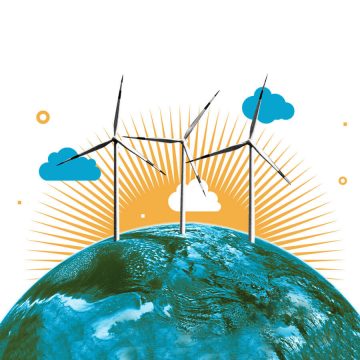Governor Newsom said California is leading by example, proving that climate action and economic growth go hand in hand. As California continues and accelerates its climate action, the Governor urged global investors to embrace the technologies and infrastructure driving the clean energy future.
Category: Climate
Stiell: we are in a new era of climate action and ambition
UN Climate Change Executive Secretary Simon Stiell, on the launch of the Nationally Determined Contributions Synthesis Report, released on 28 October 2025, said that we are in a new era of climate action and ambition. Countries are setting national climate targets – and plans to achieve them – that differ in pace and scale to any that have come before.
Progress towards the Paris Agreement goals is alarmingly inadequate
Although more than three-quarters of indicators are heading in the right direction, progress towards the Paris Agreement temperature goal is alarmingly inadequate, exposing communities, economies and ecosystems to unacceptable risks. The State of Climate Action 2025 report says that global efforts across 29 indicators are well off track, such that at least a twofold (and for most, more than a fourfold) acceleration will be required this decade to keep the 1.5°C limit within reach.
10 innovations for climate action and planetary health
A new report spotlights 10 tech solutions to accelerate climate action – from carbon-locking concrete and sustainable desalination for arid regions to cars that feed the electric grid. The research maps a wave of emerging technologies with significant potential to tackle climate disruption head-on, from droughts to methane leaks to rising seas. The report focuses on food, water, energy and materials – key systems for a stable planet – showing how science can safeguard planetary health and curb destructive human activity.
EU Climate Diplomacy: strengthening carbon pricing and markets
Carbon pricing is gaining ground worldwide as a cost-effective way to cut greenhouse gas emissions and drive clean growth. Building on 20 years of experience with the EU Emissions Trading System, the European Commission’s Task Force on International Carbon Pricing and Markets Diplomacy works with 25+ partner countries to advance high-integrity carbon pricing and markets policies.
Threatened species and precious habitats to be better protected
New funding for local projects across 12 UK Overseas Territories and 36 developing countries will be rolled out over the next five years, according to the UK Government. The package will support local action to restore nature, reduce poverty and address climate change around the world. This will help protect 1.5m hectares of forest in Bolivia, recover St Helena’s cloud forest and support critically endangered eagles in the Philippines.
Poll: upholding by EU of its own environmental laws important
New online polling conducted across 10 European countries reveals that 75% of respondents rate the upholding by the European Union (EU) of its own environmental laws within EU member states as important (38% selected “very important”, 37% selected “fairly important”).
€545m package to accelerate Africa’s clean energy transition
European Commission President, Ursula von der Leyen, has unveiled today a €545m Team Europe package to accelerate Africa's clean energy transition. This announcement is an important milestone in the ‘Scaling Up Renewables in Africa' campaign, co-hosted with South African President Cyril Ramaphosa. This campaign raises global awareness and mobilises public and private investments for clean energy generation and access across Africa.
Commission guides States on fulfilling Social Climate Plans
The European Commission has issued new guidance to help EU Member States effectively implement the Social Climate Fund (SCF) and complete their Social Climate Plans (SCPs). Starting in 2026 and mobilising over €86bn, the Social Climate Fund has been created to ensure the transition to a greener economy is fair and leaves no one behind, and to support vulnerable households and small businesses in their efforts to switch to cleaner energy and transport.
President Xi Jinping announces China’s climate commitments
China will, by 2035, reduce economy-wide net greenhouse gas emissions by 7% to 10% from peak levels, said President Xi Jinping of China at the United Nations Climate Summit on 24 September. China will increase the share of non-fossil fuels used in its energy supply to over 30%; expand the installed capacity of wind and solar power to over six times the 2020 levels; make electric vehicles mainstream; expand the National Carbon Emissions Trading Market to cover major high-emission sectors; and establish a climate adaptive society.
Close to 100 countries signal new climate targets
Close to 100 countries – including nearly 40 Heads of State and Government – have announced, committed to finalising or set out their commitment to implementing their new climate targets ahead of COP30 in Belém, Brazil this November. The announcements came at a Climate Summit convened by UN Secretary-General António Guterres and President Luiz Inácio Lula da Silva of Brazil on the margins of the 80th session of the UN General Assembly.
Climate TRACE: 1.6bn people are at harm from pollution
Climate TRACE has released a tool that makes the threat of harmful particulate matter (PM2.5) visible to all. The tool shows the flow of air pollution plumes out of sources that contribute to the climate crisis and into the air that 1.6bn people in more than 2,500 urban areas breathe.
Heatwaves linked to carbon emissions from specific energy companies
A study published in Nature shows that around one-quarter of the heatwaves recorded in the period 2000–23 can be directly linked to greenhouse-gas (GHG) emissions from individual energy companies. It says that more than one-quarter of the 213 events recorded would have been “virtually impossible” without human-induced global warming.
ShareAction: real estate investment managers fall short on climate
Research by ShareAction, which campaigns for responsible investment, shows several of the world’s largest real estate investment managers are failing to take even basic steps to tackle climate change, leaving investors exposed to financial risks and emissions unchecked in a key sector for the transition to net zero.
PIK and BOKU: 60% of the world’s land area is in a precarious state
A study by the Potsdam Institute for Climate Impact Research (PIK) and BOKU University in Vienna maps the planetary boundary of “functional biosphere integrity” in spatial detail and over centuries. It finds that 60% of global land areas are now already outside the locally defined safe zone, and 38% are even in the high-risk zone. The study was published in the renowned journal ‘One Earth’.



